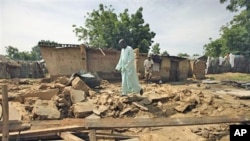Nigerian authorities say more than 2 million people have been affected by flooding in the north.
Two weeks of flooding in Nigeria's northern Jigawa state have covered nearly 90,000 hectares of farmland, destroying crops just before harvest without enough time to plant again this year.
In the village of Rinjim, farmer Nasiru Wada says he has lost everything.
Wada says all the farms and food are destroyed. And there were already problems in the village. There is nothing to eat, he says. Farmers are forced to search for food and have to work hard to find it.
Jigawa governor Sule Lamido says flooding has displaced nearly 50,000 families in the state. Some now live in school classrooms. Others sleep on high ground along the road. Lamido says the most serious damage came after flood gates were opened on dams in neighboring Kano state.
"Somehow somebody was caught napping, to be honest, because it has been there for the last 25 years so there must have been some kind of data about the pattern of the waters, in which particular months it comes in, and the kind of gradual release so it will not in any way affect the area where this river flows," said Lamido.
Authorities responsible for Kano state's Challawa and Tiga dams say those flood gates have not been opened. Once the reservoirs fill, water flows into spillways on the other side.
A spokesman for the Hadejia-Jama'are River Basin Development Authority says the larger Tiga dam has not overflowed. Water did cross over the top of the smaller Challawa dam, but the spokesman says the amount of that water could not have accounted for such devastation in Jigawa State.
Eleven of Jigawa's 27 local government areas are affected. Drinking water has been contaminated, and health officials are on the watch for cases of cholera.
More Than 2 Million Nigerians Affected by Floods




